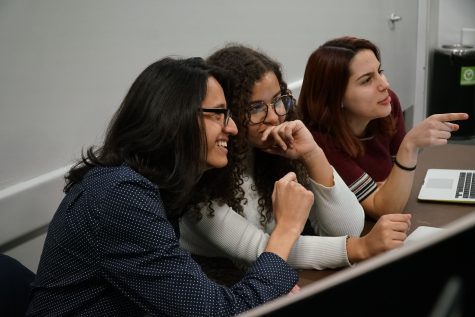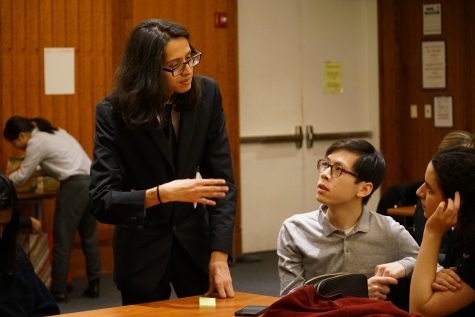As a child, CAS sophomore Carlos Martinez-Mejia would go to one of the parks near his house in Manhasset, Long Island and play with bugs the way that another kid would play with action figures.
He would position himself in the dirt near a colony of ants and pretend that the different rocks scattered across the grass were buildings.
“Go in there,” he commanded his ant minions one day, pointing to a rock that was, in his mind, obviously a Toys “R” Us. Of course, they didn’t listen. He got upset.
“Carlitos, esta bien,” his grandmother said. She sat on one of the swings nearby, watching him play.
So instead, he began flipping over rocks and decaying pieces of bark and picked up the pill bugs and millipedes he found squirming beneath them.
“You could literally overturn something and it’s like an entire world beneath your feet,” Martinez-Mejia said. “And it’s, I don’t know, it’s mind blowing to me, knowing that we’re so close to it.”
In elementary school, Martinez-Mejia would flip through hundreds of pages of facts about different animals from the Smithsonian animal encyclopedias at his local Barnes & Noble and draw a small star at the top of the pages with his favorite animals. By the time he was finished, over 50 pages would be starred. Walruses used to be his favorite, but now, he can’t decide.
“I love rhinoceros because they’re so weird, like they’re so intricate — they seem like fairy-tale creatures,” Martinez-Mejia said. “Same with giraffes, they’re just — they don’t seem like they should be real. When people talk about unicorns, I’m like, ‘Okay, well have you seen a rhinoceros?’”

The names of animals — komodo dragons, pandas, sheep, goats, penguins, dodo birds (yes, they’re extinct) — continued to spill out of his mouth, making him trip over his own words in excitement. Strands of his brown, shoulder-length hair that were carefully tucked behind his ear came loose. But he didn’t seem to notice.
“I don’t think I could ever really choose one,” he said.
His love for animals was largely inspired by his family’s frequent visits to the Bronx Zoo when he was young. Every time he went, the animals in the encyclopedia that he spent hours poring over would come to life.
At a book reading event for elementary school-aged children held at Martinez-Mejia’s local library when he was about six or seven years old, the librarians went around in a circle asking the children what they wanted to be when they grew up.
Maria Mejia-Martinez, his mom, still remembers his answer.
“All the kids his age wanted to become like a doctor or nurse, a policeman,” she said. “And when he raised his hand they asked him, what do you want to become? He said, ‘I want to become a zoologist.’”
His dream has undergone a lot of changes since then. Up until the beginning of last year, Martinez-Mejia wanted to be an actor.
It’s hard to imagine the lanky, soft-spoken student singing musical numbers, dancing and acting on a stage in front of a crowd. After all, he seemed shy just speaking about himself.
His hands fidgeted with a black hair tie while he spoke. He looped the hair tie around and in between his fingers, binding them together in a cat’s cradle-like contraption.
But once he started talking about acting, his hands paused and he unraveled his fingers from their ensnarement, snapping his hair tie onto his wrist. His eyes shone behind his thick-rimmed rectangular glasses.
“I love singing,” Martinez-Mejia said. “I’m not the best. I love to do it though.”
He spoke about acting with the same enthusiasm with which he spoke about animals. But his love for nature prevailed and he entered NYU as a biology major with the intention of becoming a vet — though he switched to double major in Anthropology and Global Public Health and environmental studies after the first two weeks when he realized that he found studying chemistry and calculus “atrocious.”
He found new creative outlets in serving as the Crisis Director for the Model U.N. at NYU — where he creates story arcs involving “crises” based on historical (with a bit of fantasy) events for visiting Model U.N. high school students to solve — and as a producer for Lamplighters, a musical theatre club that collaborates with the Theatre for Young Audiences to put on free shows for the public.
During his first year, Martinez-Mejia was an EcoRep, a peer sustainability advocate whose mission is to get the student body interested in learning more about the environment and how to reduce their ecological footprint. This year, he joined the Ecommittee, a new initiative designed to help guide new EcoReps in engaging with their community and organizing events. While he was an EcoRep, he organized a Trash Trivia activity, where students were tested on their recycling knowledge, as well as a terrarium-making activity.
When he was young, he made self-sustaining terrariums for fun by filling a mason jar with moss. He was amazed by how quickly it would grow until it congealed into a jungle of green mass, pressing against the side of the glass.
Even now, he views the world with the same childlike wonder.
“There’s moss on the streets of New York City, and I’ll look at it and I’m like, ‘Oh, that’s so cute, I can make a terrarium out of you,’” Martinez-Mejia said.
Though others may not understand his passion — like Martinez-Meija’s father, who doesn’t believe in climate change — he is constantly looking for ways to engage people with their environment, and challenging them to view the world in ways that they had not considered before.
“Carlos actually taught me a lot,” Michelle DeLustro, a sophomore SUNY Albany and high school friend of Martinez-Mejia said. “Because before that, I think I was part of the problem; I kind of just took a back seat. Then he started educating me on stuff like that and it made me realize this is a big problem.”

How to be sustainable is not always approachable nor is it easy to understand. But the way that Martinez-Mejia presents it makes it easy to get swept along. He makes sustainability more accessible to others by providing easy and enjoyable ways to incorporate it into their daily lives, while still acknowledging the very serious ramifications it attempts to combat.
In addition, whether he is talking about acting or animals, his fascination is so authentic, one can’t help but listen to what he was to say. Behind his modest appearance and humble claims, his passion is virtually tangible, and his desire to share it with others is unrelenting.
“Carlos has just such a way with his peers,” Sophie Golomb, Manager of NYU’s Office of Sustainability and EcoReps supervisor, said. “He just is very good at making connections and I think in those relationships he’s able to bring sustainability forward in a way that’s very, you know, impactful ultimately.”
Aside from wildlife conservation, Martinez-Mejia recognizes that there is a plethora of environmental concerns that are equally, if not more, demanding of people’s attention.
While animals first piqued his curiosity in the environment, his interests continued to grow as he conducted more research. He learned about the other devastating effects of climate change that impact not just animals, but people, which is why he chose his current majors. By focusing his efforts in one area, whether it be conservation or environmental justice, he discovered one can have an impact in all areas of environmentalism.
For Martinez-Mejia, all environmental issues, and methods of mitigating them, are intertwined.
He uses the intentional burning of Brazil’s rainforests as an example of the ways in which environmental issues can affect multiple groups. Not only does it destroy animal habitats, but it endangers the livelihood of indigenous people living there as well as the global community by increasing carbon emissions.
“I think it’s something that we need to look at with different lenses, but make sure we handle it as quickly and effectively as possible,” Martinez-Mejia said.
The lens through which Martinez-Mejia looks at the environment makes nature appear as if it is a different world.
On a microscopic level, from the interaction of ants to the moss growth in his terrarium, every element is essential to their own micro-ecosystem. But at the same time, these small organisms work together to shape the earth’s natural systems: everything is interconnected.
“A lot of people tend to not realize how close they are to such incredible ecosystems,” Martinez-Mejia said. “Although, you know, some people don’t really like insects that much, and that’s okay.”
Of course, it would be nice if everyone were as enraptured by nature as he is. Not everyone likes to play in the dirt with insects and read hundreds of pages of facts about animals, like he did as a kid. But everyone is affected by climate change.
He says he doesn’t mean to be “dramatic,” but admits that the enormous scale of this existential threat frightens him. Nevertheless, his positivity shines through.
“At the end of the day like you can, you know, promote it as much as you can and some people still may not listen and you can’t be like, ‘Oh, this is my fault, the world is going to end because my inaction, or lack of action,’” Martinez-Mejia said. “I think it’s just really important to get to the people that you can, and then hope they spread the message.”
Email Arin Garland at [email protected].


























































































































































